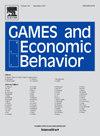对变化的喜好
IF 1
3区 经济学
Q3 ECONOMICS
引用次数: 0
摘要
决策者在有限的行动集合中反复选择一个。在每个时期,决策者的收益取决于所选行为的固定基本收益和过去选择该行为的频率。我们分析了与无限收益的三种评估类型相关的最优策略:贴现现值、局部平均的极限劣势和极限优势。我们表明,当前两个是评估方案(并且折扣因子足够高)时,平稳策略可以获得最佳可能结果。然而,对于后一种评估方案,平稳策略只有在最优平稳策略选择的所有严格正频率的行动具有相同的基本收益时才能获得最佳结果。本文章由计算机程序翻译,如有差异,请以英文原文为准。
A taste for variety
A decision maker repeatedly chooses one of a finite set of actions. In each period, the decision maker's payoff depends on a fixed basic payoff of the chosen action and the frequency with which the action has been chosen in the past. We analyze optimal strategies associated with three types of evaluations of infinite payoffs: discounted present value, the limit inferior, and the limit superior of the partial averages. We show that when the first two are the evaluation schemes (and the discount factor is sufficiently high), a stationary strategy can achieve the best possible outcome. However, for the latter evaluation scheme, a stationary strategy can achieve the best outcome only if all actions that are chosen with strictly positive frequency by an optimal stationary strategy have the same basic payoff.
求助全文
通过发布文献求助,成功后即可免费获取论文全文。
去求助
来源期刊

Games and Economic Behavior
ECONOMICS-
CiteScore
1.90
自引率
9.10%
发文量
148
期刊介绍:
Games and Economic Behavior facilitates cross-fertilization between theories and applications of game theoretic reasoning. It consistently attracts the best quality and most creative papers in interdisciplinary studies within the social, biological, and mathematical sciences. Most readers recognize it as the leading journal in game theory. Research Areas Include: • Game theory • Economics • Political science • Biology • Computer science • Mathematics • Psychology
 求助内容:
求助内容: 应助结果提醒方式:
应助结果提醒方式:


